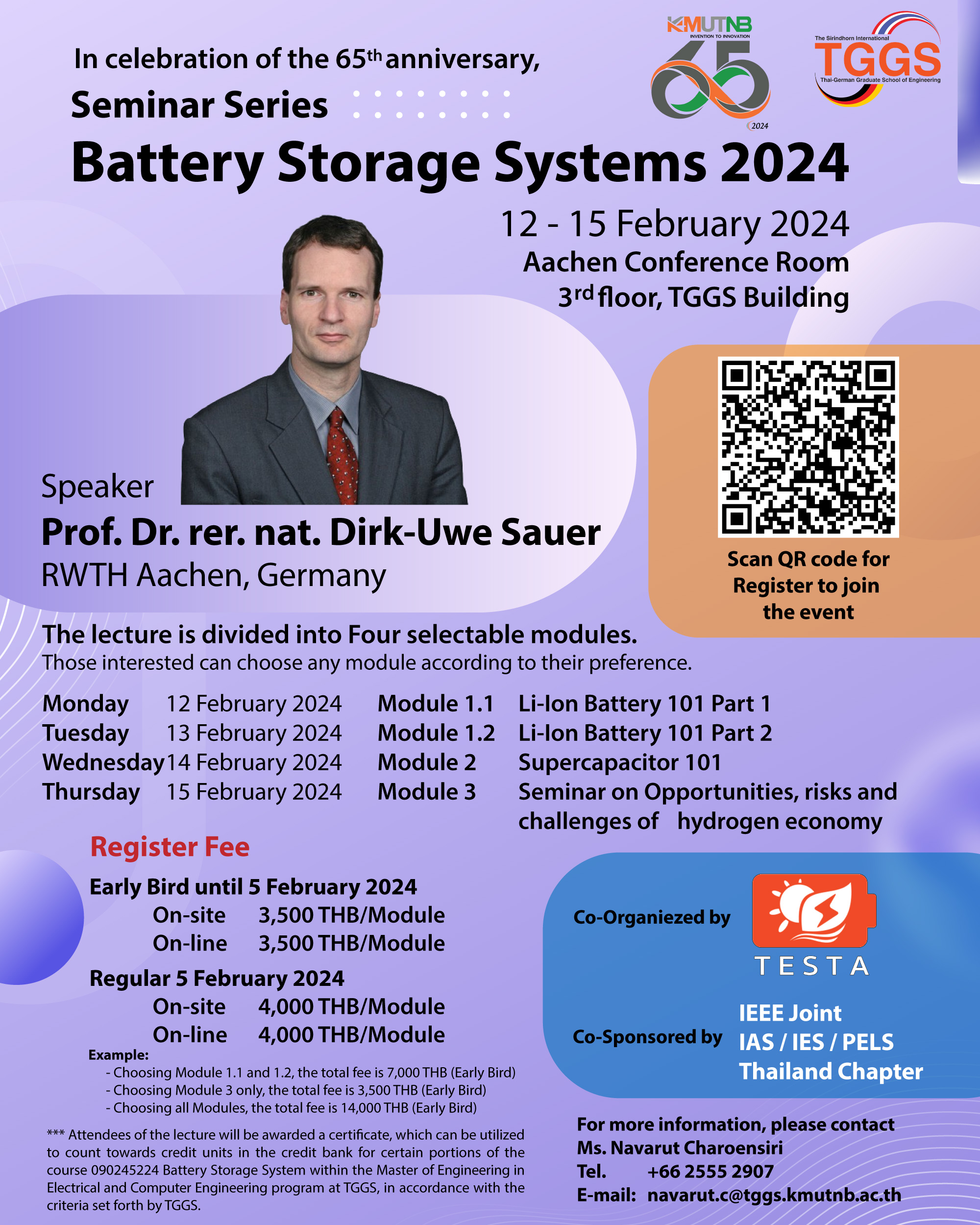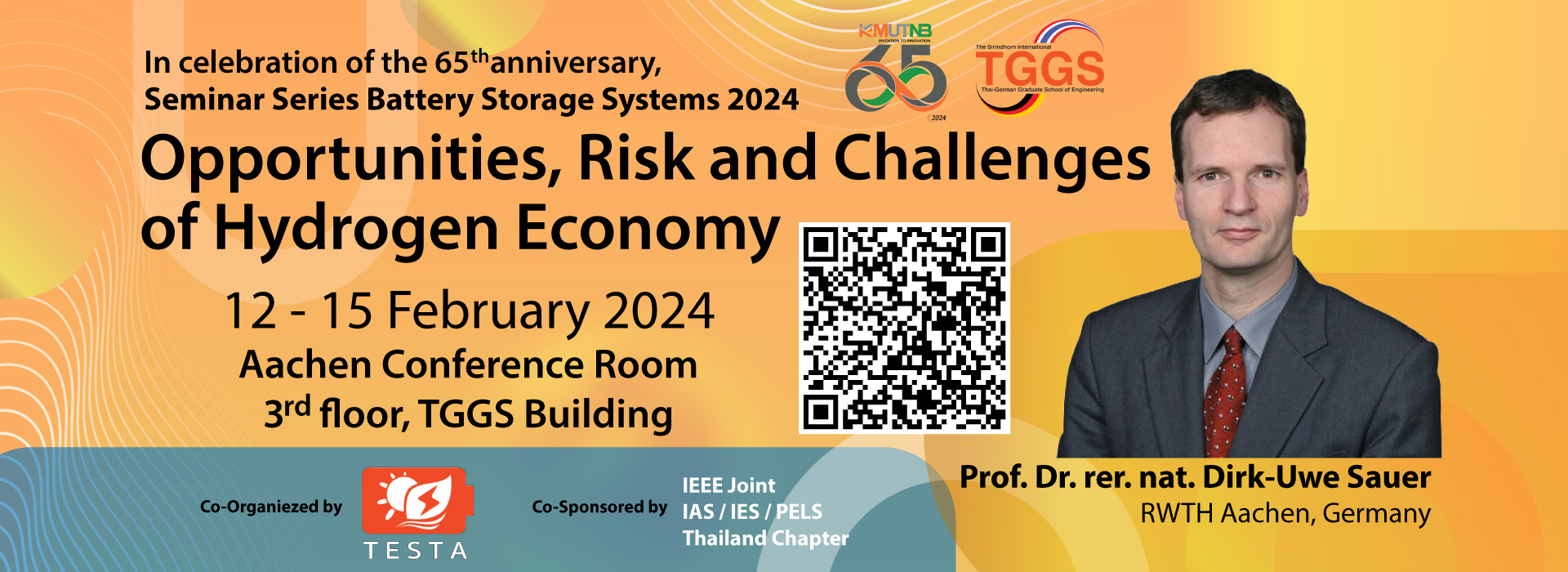12-15 February 2024
Aachen Conference Room
3rd floor, TGGS Building, KMUTNB
09:00 – 16:30 hrs. (GMT+7)
Opportunities, risks and challenges of a hydrogen economy
A climate-neutral and sustainable energy system will be based centrally on electricity generation from renewable energies. Wherever it makes sense, electricity can then be used efficiently either directly or, for example, after intermediate storage in batteries. As a second important pillar, however, hydrogen is needed as an energy carrier. Produced from renewable electricity, hydrogen can be used in a variety of CO2-neutral ways. However, pure hydrogen will only be used in a few places; instead, hydrogen derivatives such as ammonia, methanol, methane or liquid hydrocarbons will be produced. This requires either nitrogen or carbon in addition to hydrogen. The latter will mainly be available as CO2 and also requires complex CO2 management.
In a global hydrogen economy, hydrogen and its derivatives will become freely tradable and transportable energy sources, like gas and oil today. However, the technical transport options and their costs must be taken into account, as these are considerably higher than for gas and oil today.
Hydrogen and its derivatives can then be used in a variety of ways. These include material use, e.g. as a raw material for the chemical industry or for the smelting iron ore, but also energy use, e.g. as an energy carrier with high energy density in aeroplanes or ships and in the electricity sector to secure the power supply in the event of insufficient power generation from wind power and photovoltaic systems.
Based on technical breakthroughs and cost estimates, it will also be discussed where hydrogen and its derivatives will be the central solution and where there are efficient alternatives.
Main topics:
- Hydrogen as part of a climate-neutral and sustainable energy system
- Hydrogen derivates, transport, costs and demand for infrastructure
- Hydrogen use in various applications and comparison with alternatives
| Early Bird until 5 February 2024 | |||
| On-site | 3,500 THB/Module | ||
| On-line | 3,500 THB/Module | ||
| Regular 5 February 2024 | |||
| On-site | 4,000 THB/Module | ||
| On-line | 4,000 THB/Module | ||
Seat Reservation
Bank transfer to Kasikorn Bank, Bang-Po Branch (บางโพ)
Account: King Mongkut’s University of Technology North Bangkok
Saving Account Number: 033-1-00226-7
Organized by TGGS – The Sirindhorn International Thai-German Graduate School of Engineering
Co-organized by TESTA – Thailand Energy Storage Technology Association
Co-Sponsored by IEEE Joint IAS/IES/PELS Thailand Chapter
.
The Lecture is divided into 4 selectable modules.
[ Module 1.1 ] Li-Ion Battery 101 Part 1
Date & Time:
? Monday, 12 February 2024
? 09:00 a.m. – 16:30 p.m. (UTC +7)
[ Module 1.2 ] Li-Ion Battery 101 Part 2
Date & Time:
? Tuesday, 13 February 2024
? 09:00 a.m. – 16:30 p.m. (UTC +7)
[ Module 2 ] Supercapacitor 101
Date & Time:
? Wednesday, 14 February 2024
? 09:00 a.m. – 16:30 p.m. (UTC +7)
[ Module 3 ] Seminar on Opportunities, Risks, and Challenges of the Hydrogen Economy
Date & Time:
? Thursday, 15 February 2024
? 09:00 a.m. – 16:30 p.m. (UTC +7)
Venue: Hybrid Mode
1) On-Site (Maximum 50 Seats)
– Aachen Conference Room, TGGS Building (3rd Floor), KMUTNB, Bangkok, Thailand
*** On-Site participants will obtain a paper certificate after successful participation.
2) On-Line (Unlimited)
– Microsoft Teams
*** On-Line participants will obtain an electronics certificate after successful participation.
.
For more information, please contact
Ms. Navarut Charoensiri
Tel. +66 2555 2907
E-mail: navarut.c@tggs.kmutnb.ac.th




